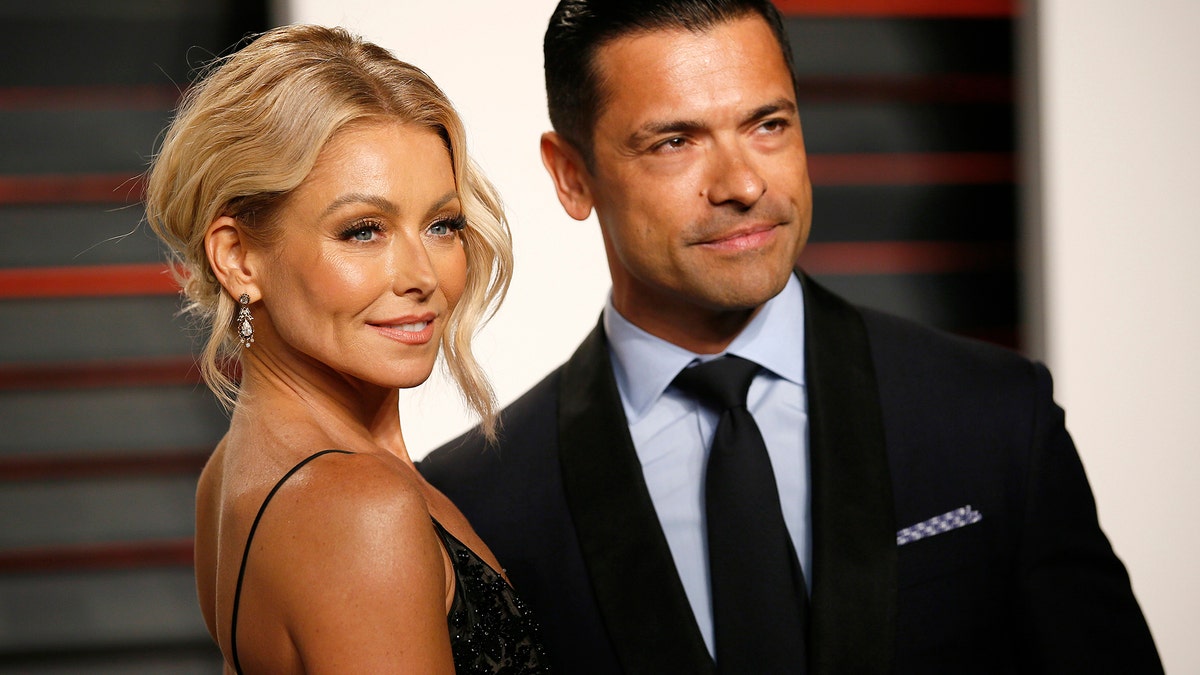
Actress Kelly Ripa and husband Mark Consuelos arrives at the Vanity Fair Oscar Party in Beverly Hills, California February 28, 2016. (REUTERS/Danny Molosho)
Kelly Ripa made headlines earlier this month after saying on “Live with Kelly” that her husband, Mark Consuelos, is “mean” after sex, and while she backpedaled Wednesday by clarifying he is simply “disinterested” afterward, the damage had already been done. Ripa’s Feb. 9 admission, whether in jest or not, has been trending on various news sites, including this one, ever since.
Regardless of Ripa’s intention, her observations about her husband’s post-sex behavior beg the question: Do men really get disinterested after sex? And if so, why?
Popular science’s explanation for men rolling over after ejaculation is a hormonal response alone, Dr. Raj Dasgupta, a professor of pulmonary and sleep medicine at the University of Southern California, and a spokesperson for the American Academy of Sleep Medicine, told Fox News.
THIS IS YOUR BRAIN ON PORNOGRAPHY
However, some experts argue the answer isn’t so simple.
In fact, Dasgupta said, the conditions under which couples have sex often have as much to do with whether men or women get sleepy after sex as do their postcoital hormonal differences.
“It’s a balance of both,” Dasgupta said.
Dasgupta explained that most couples have sex at night, potentially in cool, quiet rooms, likely in a comfortable bed — in other words, the perfect environment for sleeping. And for those men who may have sleep apnea, the aforementioned conditions can create the perfect environment for dozing off.
“If you have a male who has undiagnosed sleep apnea, they’re gonna be more tired than the average person, so it doesn’t take a lot to tip them over,” Dasgupta said.
According to data from the Cleveland Clinic, that may be a fair assessment. The hospital estimates nearly 22 million Americans suffer from sleep apnea — a condition marked by shallow breathing that impacts quality sleep, and can lead to drowsiness and fatigue — and men over age 40 are primarily at risk.
Hormones may also play a role in human behavior after sex, though.
9 FOODS THAT CAN HELP BOOST YOUR SEX DRIVE NATURALLY
Much of the research surrounding hormonal interactions following sex involves animals, Dasgupta said, but compared to women, men do have more of the hormone prolactin, which secretes after ejaculation and leads to what’s called a relative refractory period. That post-stimulated stage is what animal studies have linked with sleepiness.
Also after ejaculation, the stress hormone cortisol decreases, while oxytocin, the “feel-good” hormone, increases — promoting relaxation. And, if you’re in a dark room, the hormone melatonin, which promotes sleep, increases, further encouraging men to fall into slumber, Dasgupta said.
At nighttime, the hormone vasopressin, or ADH (antidiuretic hormone) is also secreted after ejaculation. This is the same hormone that prevents us from getting up at night to use the bathroom, Dasgupta said, and it, too, promotes relaxation.
“These are hormones that have been associated with ejaculation at night,” said Dasgupta, stressing that much of the research does not draw a causative relationship, just a link. “They may be some of the answers to why males are more sleepy at night, but it’s always gonna be a combo of the social aspects and some of the hormones together.”
THIS SWEDISH POLITICIAN THINKS WORKERS SHOULD GET PAID SEX BREAKS
Ian Kerner, a licensed psychotherapist and sex counselor, told Fox News the answer may simply lie in the fundamental differences between men and women’s sexual response cycle.
When men become aroused, Kerner said, blood surges to the genitals and eventually leads to ejaculation. Upon ejaculation, that blood flows out and men go into the aforementioned refractory period. Some men, usually those who are young, can go back to having sex immediately, while older men may take days, weeks or month until they’re rearing to go again.
“But the main thing is, after a man ejaculates, he returns to the pre-aroused state,” Kerner explained, “and the neurochemical firework festival of orgasm also produces sort of an effect of relaxation and sleepiness.”
After women reach orgasm, on the other hand, it takes longer for their blood flow to leave the genitals, so they do not return as quickly as men to a pre-aroused state, Kerner said.
Instead, he explained, “They go into a semi-aroused state, and that’s why a lot of women have the capacity to experience multiple orgasms, and remain a little more connected, interested and partner-focused after sex.”
Meanwhile during orgasm, pent-up muscular stress in men and women gets released, which may lead men and women to drift into a relaxing state. But it’s the difference in men and women’s aroused states that sometimes causes men to appear sleepier than women, Kerner said.
EXPERTS SAY THIS IS THE BEST WAY TO FLIRT
That research, he pointed out, comes from researchers William Masters and Virginia Johnson, who studied 10,000 hours of male and female orgasms by watching couples in 1950s. They are best known for their research on the human sexual response, on which they published a book of the same name in 1966.
The hit Showtime production "Masters of Sex" is thought to be based on Masters and Johnson's lives.
And yet, despite what's known about how male and female sexual response cycles differ, Kerner said he has counseled couples where the woman will be the one more prone to falling asleep, or either sex taking issue with his or her partner checking email or jumping out of bed after doing the dirty deed.
“So I think it’s gender-based, but it’s also relationship based,” Kerner said.








































